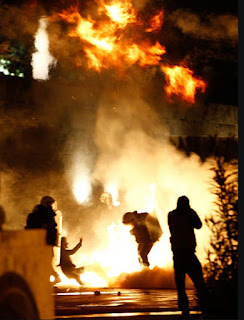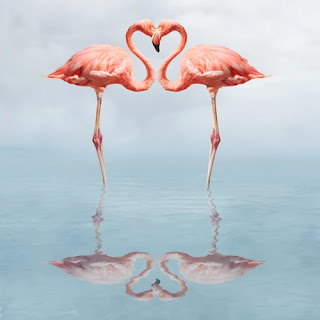Economic recession and the relationship with War
Even though various governments have infused around $10 trillion by way of bailout packages and lowered interest rates to near zero levels,
the world economy has failed to emerge from the clutches of recession. In fact, the situation is turning worse.
History shows that war always follows slowdown or recession. And given the somber geo-political situation across the globe, some economists and analysts feels that the world may well be headed in this direction.
After the 1797's economic deflation, there was war between US and France from 1798 to 1800. The war between US and Great Britain in 1812 followed the depression in 1807-1808. The long depression of 1873-1879 paved the way for war between US and Spain and the First World War which lasted till 1918.
The Second World War was followed by the Great Depression of 1929-1939. The early 1990's recession again put US on the war front against the Iraq. History shows that most of the wars have followed the economic crisis-- there are very few occasions when world faced slowdown or recession after the wars. Economy faced a recession after the First World War which lasted for 3 years from 1918-1921.
In the Great Depression, Herbert Hoover--then US president--attempted to maintain labor rates at 1929 levels, causing massive unemployment. The economy stagnated, with labor rates failing to adjust to levels where production could be refurbished.
The world was only rescued by the advent of World War II, with increased war production and mobilization-- solving the unemployment problem. The prevailing conditions are no different from that in 1920-1930's. The credit crunch after the sub-prime problem has literally put the global economy on the verge of depression which is on the lines of 1930's.
Kevin Peter, an economist at Real World Advisory, says that “psychologists such as E.F.M. Durban and John Bowlby have argued that human beings are inherently violent. While this violence is repressed in normal society, it needs the occasional outlet provided by war. This mixes with other notions such as displacement, where a person transfers their grievances into bias and hatred against other ethnic groups, racial groups, religions, nations or ideologies.” However, a paradigm shift in global political scenario could be a barrier to war-like situation. According to Saugata Bhattacharya, vice president – business and economic research, Axis Bank, “Although war as a solution to economic revival is an interesting hypothesis under the present context, but there is no likelihood of war. Armed struggle is no solution of economic crisis in the current time.”
Bhattacharya says there could be export restrictions by individual countries to stimulate domestic economy.
Shanto Ghosh, director – principal economist, Deloitte and Haskins, concurred, saying, “trade restrictions are very much possible. Even China (an export oriented economy), has felt the urge of pumping up domestic demand and hence changing focus of their economy.”
Meanwhile, rising tensions between India and Pakistan have created a war-like situation between the neighbouring countries, and attracted world attention.
However, defence analyst Zubin Pandit believes that “although tension between India and Pakistan over the Mumbai attack is intensifying, it is unlikely that these countries will go for war as both are well equipped with advanced armaments such as nuclear weapons. But embargo on exports and other trades might create havoc in near time.”
This is already being seen, as the government of Pakistan in December sanctioned embargo on Indian exports and is also planning to ban India's goods going to Afghanistan via their territory.
“An export ban by Pakistan on commodities like oil and gas hardly leaves any impact on our economy. The country, which is on brick of economic collapse, assumes no importance,” feels Deloitte’s Ghosh.
the world economy has failed to emerge from the clutches of recession. In fact, the situation is turning worse.
History shows that war always follows slowdown or recession. And given the somber geo-political situation across the globe, some economists and analysts feels that the world may well be headed in this direction.
After the 1797's economic deflation, there was war between US and France from 1798 to 1800. The war between US and Great Britain in 1812 followed the depression in 1807-1808. The long depression of 1873-1879 paved the way for war between US and Spain and the First World War which lasted till 1918.
The Second World War was followed by the Great Depression of 1929-1939. The early 1990's recession again put US on the war front against the Iraq. History shows that most of the wars have followed the economic crisis-- there are very few occasions when world faced slowdown or recession after the wars. Economy faced a recession after the First World War which lasted for 3 years from 1918-1921.
In the Great Depression, Herbert Hoover--then US president--attempted to maintain labor rates at 1929 levels, causing massive unemployment. The economy stagnated, with labor rates failing to adjust to levels where production could be refurbished.
The world was only rescued by the advent of World War II, with increased war production and mobilization-- solving the unemployment problem. The prevailing conditions are no different from that in 1920-1930's. The credit crunch after the sub-prime problem has literally put the global economy on the verge of depression which is on the lines of 1930's.
Kevin Peter, an economist at Real World Advisory, says that “psychologists such as E.F.M. Durban and John Bowlby have argued that human beings are inherently violent. While this violence is repressed in normal society, it needs the occasional outlet provided by war. This mixes with other notions such as displacement, where a person transfers their grievances into bias and hatred against other ethnic groups, racial groups, religions, nations or ideologies.” However, a paradigm shift in global political scenario could be a barrier to war-like situation. According to Saugata Bhattacharya, vice president – business and economic research, Axis Bank, “Although war as a solution to economic revival is an interesting hypothesis under the present context, but there is no likelihood of war. Armed struggle is no solution of economic crisis in the current time.”
Bhattacharya says there could be export restrictions by individual countries to stimulate domestic economy.
Shanto Ghosh, director – principal economist, Deloitte and Haskins, concurred, saying, “trade restrictions are very much possible. Even China (an export oriented economy), has felt the urge of pumping up domestic demand and hence changing focus of their economy.”
Meanwhile, rising tensions between India and Pakistan have created a war-like situation between the neighbouring countries, and attracted world attention.
However, defence analyst Zubin Pandit believes that “although tension between India and Pakistan over the Mumbai attack is intensifying, it is unlikely that these countries will go for war as both are well equipped with advanced armaments such as nuclear weapons. But embargo on exports and other trades might create havoc in near time.”
This is already being seen, as the government of Pakistan in December sanctioned embargo on Indian exports and is also planning to ban India's goods going to Afghanistan via their territory.
“An export ban by Pakistan on commodities like oil and gas hardly leaves any impact on our economy. The country, which is on brick of economic collapse, assumes no importance,” feels Deloitte’s Ghosh.


